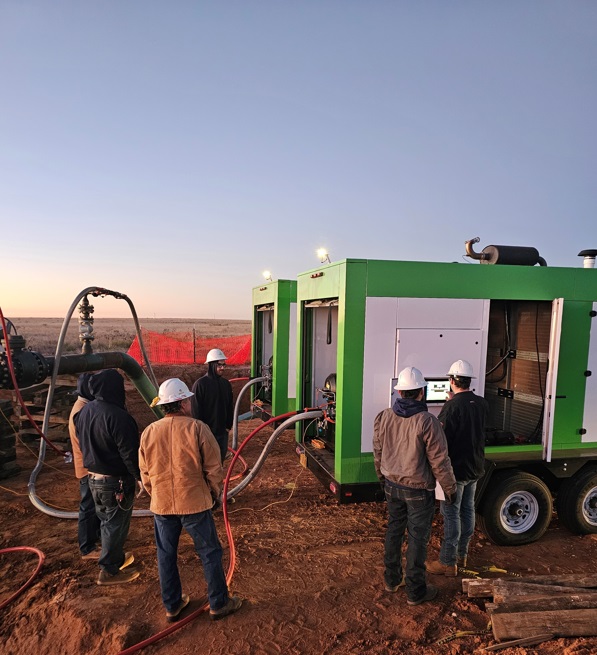
ZENRG Services recently secured funding From Chevron, BP Energy Partners and EIC Rose Rock to support its expansion of compression technology that keeps methane from being vented or flared. (Source: ZENRG Services)
ZENRG Services is really looking forward to 2025.
The company, which helps energy companies reduce emissions, secured Series A funding to support its expansion plans in late December. The investment, led by EIC Rose Rock, included Chevron Technology Ventures, BP Energy Partners and existing investors.
ZENRG’s value proposition is simple, CEO Joe Chandler told Hart Energy. It can collect gas or liquids that would have escaped from pipelines or operations, then return them to the pipeline.
“We’re able to keep all the customers’ material, whether it be gas or liquids, in that system that the customer owns by compressing it under high pressure,” said Chandler, formerly the CEO of Yellowjacket Oilfield Services. “The technology that we use hasn’t been readily available in the market before, and now we are using it in several different ways.”
That yields three positives for customers.
“The customer is saving money, number one,” Chandler said. “Number two, it is a safer process than burning it. And then three, you’re improving the environment by not releasing the tons and tons of carbon into the atmosphere that you would have previously.”
ZENRG is benefiting as the energy industry’s efforts to reduce methane emissions are gaining traction. S&P Global Commodity Insights estimated that methane emissions from the Permian Basin declined 26% in 2023.
Sam Edwards, ZENRG’s co-founder and COO, said ZENRG formed in late 2021 with two applications in mind.
“We probably have north of 25 applications” at work in upstream, midstream, downstream, chemicals and utilities, he said. “Once they understand the concept is as easy as moving product from one area or one vessel or pipeline or other containment that is under pressure into another area that’s able to receive it, that’s when the client’s minds will start to work and the brainstorm will begin to occur.”

ZENRG deploys mobile units to its three job sites in the Permian Basin; Houston; and in Greeley, Colorado. The units maintain proper pressure between the source and the destination, enabling the transfer of gas produced at the well, methane, LNG, highly volatile liquids and highly reactive volatile organic compounds.
One utility customer had gas trapped in miles of 10-inch lines that would have been wasted a few years ago, Chandler said.
“They brought us in, we hook up on the side that has the trapped gas on the line, and there’s another line, the discharge line, that goes into the line we are going to pump into,” he said. “We’re grabbing the product out of one pipe, running it through our equipment and then pushing it back to the higher pressure. We did that for about 11 hours and we saved a tremendous amount of gas.”
David Clouse, managing director of EIC Rose Rock, said his firm picked ZENRG out of more than 100 companies in the emissions-reduction space because the solution makes money under current regulations and has broad applicability. EIC Rose Rock focuses its investments in three core areas: energy transition, digitalization and sustainability.
“We invested in this one because it led with an economically beneficial solution,” he said. “It’s not dependent on government mandates or whether the Trump administration guts all of the emissions regulations and mandates and potential fees.”
Chandler said he expects ZENRG, which has 16 employees, to double in size in the year ahead.
“I’m excited about what the year holds for us with the expansion that we’re going to see, from East Coast to West Coast and cities we already know we’re getting ready to move into,” he said. “It’s truly just a matter of how quickly can you train people, how quickly can you set up locations. This is growth like I’ve never seen.”
Recommended Reading
ADNOC Explores $9B Acquisition of Aethon’s Haynesville Assets—Report
2025-04-11 - Abu Dhabi National Oil Co. (ADNOC) is evaluating an acquisition of natural gas assets from Aethon Energy Management valued at around $9 billion, Bloomberg reported April 11.
FTC May Reconsider Hess, Sheffield Bans on Holding Board Seats
2025-04-11 - The Federal Trade Commission has announced it is seeking comment on potentially rescinding bans on Pioneer Natural Resources’ Scott Sheffield and Hess Corp.’s John Hess from serving on the boards of companies that acquired their E&Ps.
CRTS Global Secures RAE Energy’s Coatings Business
2025-04-10 - Voyager Interests portfolio company CRTS Global is growing in the pipeline coatings market with its acquisition of RAE Coatings, a provider of protective external coatings for offshore pipelines.
Abu Dhabi’s Mubadala Buys Stake in Kimmeridge Shale Gas, LNG Ventures
2025-04-10 - Mubadala Energy, owned by Abu Dhabi’s sovereign wealth fund, is buying a stake in Kimmeridge Texas Gas (KTG) and Commonwealth LNG as the United Arab Emirates company makes an entry into U.S. shale.
SBM Offshore Signs $400MM Sale and Leaseback for FPSO Cidade de Paraty
2025-04-09 - SBM Offshore holds a 63.125% interest in FPSO Cidade de Paraty, located offshore Brazil.
Comments
Add new comment
This conversation is moderated according to Hart Energy community rules. Please read the rules before joining the discussion. If you’re experiencing any technical problems, please contact our customer care team.





